The Transition from Primary School to Secondary School in the Province of Buenos Aires, Argentina
Malvina E. Massaro, Argentina
B.A.Malvina Massaro has been teaching English at state-run primary school level in the Province of Buenos Aires for eighteen years. She also works for teachers´training colleges and teaches ESP at technological education centers.
E-mail: malvinaemp@gmail.com
Menu
Characteristics of the transition period from primary school to secondary school
Reasons to plan a careful articulation between primary and secondary school
The role of ELT in this transition
Lesson outlines
References
The transition between primary school and secondary school is a transcendent and particularly difficult period in the students´ lives because they go through a process of adaptation and adjustment in relationship with many important aspects: change in the educational environment and culture, a great difference in their status of students and the beginning of adolescence.
In other words, this is a quite stressful change from the” protective and familiar nest” of primary school to an impersonal and, often, intimidating atmosphere of secondary school.
This opening period to “the new world”of secondary school begins during the final year of primary school. It is during the last months of the sixth year of primary education in the province of Buenos Aires, Argentina that learners begin feeling worried about the social and academic aspects of the next step in their education. These feeling are usually originated in their lack of knowledge about the secondary school educational system in general and /or the secondary school institution they will be attending the next year, in particular.
The following are some of the most common fears and anxieties expressed by learners in the closing year of primary school:
- Being the youngest students in the secondary school institutions.
- Feeling at a loss.
- Having more teachers.
- Not having free time.
- Not knowing the rest of students in their class.
- Timetable organization.
- Having more homework.
- Not knowing the facilities of the secondary school they will be attending.
(Guevara, L., Castro Perez, M. & León Sáenz, A., 2010)
Authorities and teachers working with secondary school newcomers sustain that this transition is usually problematic for them, too, as the students´ uncertainty and worries are reflected on their academic production and behaviour. Thus, working on this transition period from the last term of the sixth year of primary school onwards, would make it easier to endure, not only for students and teachers, but the whole educational system, as well.
In spite of this fact, only in a few institutions some strategies are planned and put into practice, such as visits to a secondary school institution or holding meetings with secondary school teachers or first year students . (Guevara, L., Castro Perez, M. & León Sáenz, A., 2010)
These would be of great importance because getting information from the right people, that is to say, members of secondary school institutions intead of siblings, friends or parents, would eliminate the main source of doubts and conflicts.
Besides, holding meetings with those learners who are already doing the first year of secondary school would also be a great opportunity for them to act as “anchoring agents” to the new educational structure. These elder students would be able to identify themselves and understand the newcomers´ situation, feelings and emotions. Moreover, this experience would be fully significant for those receiving help, as the following year they would be in a better position to assist new groups of students beginning secondary school.
Articulating with secondary school during the last months of the sixth year of primary school is definitely worthwhile putting into practice in every classroom.
This is particularly possible to do in ELT due to its unique features. It provides ample opportunities for enhasing learners´ life quality (Pishghadan, R. & Zabihi, R., 2013) ,in this case facilitating the expression of emotions and fears; as well as satisfying students´ educational needs through the provision of favourable circumstances for the development of language proficiency.
In this way, ELT would meet the main requirement of Humanistic Education, that of empowering learners by bringing about successful learning as a result of feeling, thinking and doing. By helping students during this transition in the ELT classroom they are prepared to meet one of life´s challenges. (Churchill, J., 2007)
The following lesson outline (Massaro, M. & Loiza, A. , 2013) is based on needs analysis, catering for learners´needs and interests. These should be of great concern for material developers and lesson planning practitioners because this makes the objective of a course more feasible. Besides, it serves the main purpose of education: to make students ready for life, a meaningful and purposeful enterprise.
How do I feel about it all????
Let´s read the following e-mail sent to you from a new e-pal:
Hi! My name is Nahuel. I´m 11 years old and I attend EP N° 100 in Morón. I´m doing year 6 and I like my school very much. There I know all the teachers, the secretary, the headmistress and most of students because my brother is in year 2. Of course, all my friends are in my class, including Diego, my best friend.
My favourite subjects are P.E and Maths. I like English, Music and Language but I hate Science. It´s boring!!!!
My mum says that next year everything will be different because I´m starting secondary school. I know I will have to study a lot and I will have lots of teachers. OUCH!!!
What makes me sad is that not all of my mates will attend the same secondary school. But Diego and me will attend ES N° 4. This is great!!!
What about you? How do you feel about it all? Nahuel
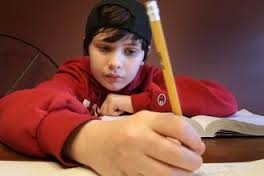
Let´s read the text again. Can you find some information on the following? Check it out!:
- Nahuel.
- The reason why he likes his school.
- The subjects he likes.
- Differences between primary school and secondary school.
- How he feels about these differences/changes.
About you!
What about you?? You are the protagonist! Let´s complete these bubbles with your personal information.
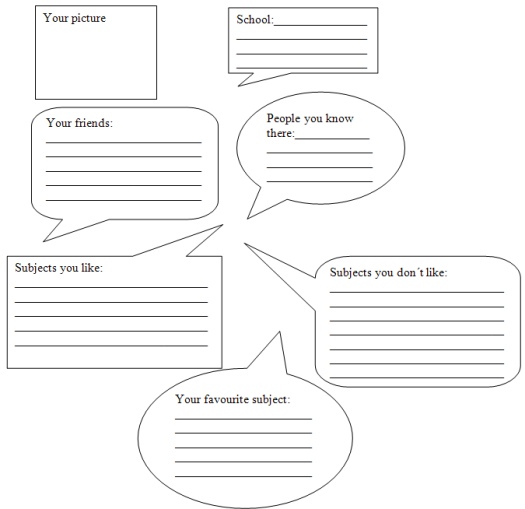
How do you feel about starting secondary school?
Students usually have different feelings about starting secondary school. Have a look at what they say:

Mayra-EP N° 29
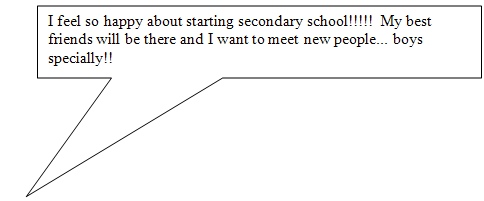

Martín- EP N° 56
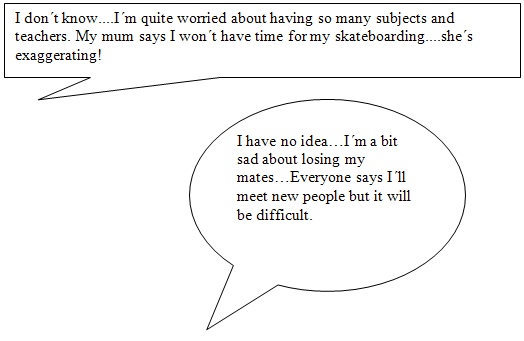
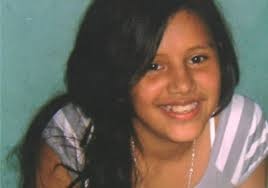
Magalí- EP 23
Do you feel identified with any of them? Why?
.................................................................................................................
Starting secondary school is an icon in your life. It should not be that difficult!! Don´t worry and relax! Have a look at this blog. It´s really cool, isn´t it?
Many students, like me, are starting Secondary School in 2015,
so I thought of telling you about some of my ideas
to have a good start (drop a comment if you like!)
- The first thing is to make friends with different people. There will be lots of students coming from many primary schools, so try to break the ice and talk to them.
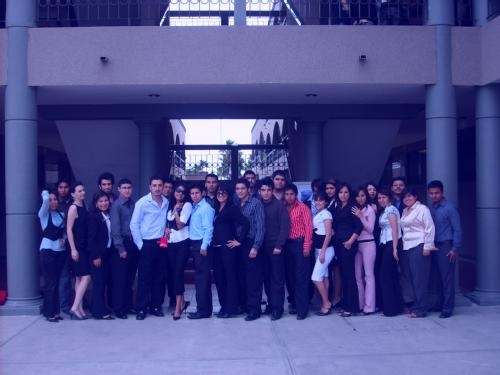
- Boyfriend? Girlfriend?? NO,no, no!!!! Don´t start looking for trouble! !It´s time to meet new friends. Group outings are better and really fun.
- Something very important is to get on well everybody. Someone who looks different from you, may also be fun!!
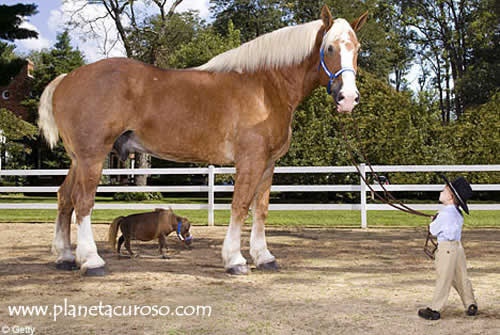
- Please, take care of your aspect! I know that you like wearing your baseball cap, but you can do it after school.
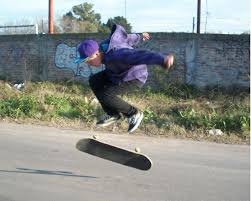
- Homework! Ouch! But you have to do it, anyway. It would be a good idea to get passing marks, too.
- Be yourself and stay with those friends who accept you as you are.

This is very important! I know that you hate going to bed early but it´s necessary to have a good day at school. Besides, getting asleep in class sucks!

- Perhaps you don´t get on well with some, but respect comes first!
What do you think? Are these tips useful? All of them? Classify them into Useful or Useless in your opinion.
Useful _____________________________________________________________
Useless _____________________________________________________________
Is there any other tip that you think would be important to include in this blog? Add it!! You may use these expressions:
I think it would be a good idea to/ not to ...
You should/ shouldn´t ...
If I were you I would/ would´t ....
It would also be a very good idea to think of possible topics to start a conversation with those classmates you don´t know during the first days at your secondary school. Let´s do it together!!
- Facebook
- Computers
- ____________
- ____________
- ____________
- ____________
- ____________
- ____________
This is really a lot of information!!! Why don´t you use your personal information and the previous activities to write an e-mail to answer Nahuel´s e-mail? Try to include some tips to survive the first days of secondary school. I´m sure you can do it!!
-----------------------------------------------------------------------------------------------------
A visit to a REAL secondary school
Starting secondary school will be easier if you get useful information from those who know about it and have been through the same experience. Why don´t you prepare some questions to ask those students who are already in first year? Let´s write them here:
- ________________________________________________________________
- _________________________________________________________________
- _________________________________________________________________
- ________________________________________________________________
- _________________________________________________________________
( It would be great if these questions were handed in to the teacher in first year so that the aswers are prepared by students. In this way, communication would be really fluent during the visit)

Give me a hand, and an ear, too!!
This is a project that goes beyond the English classroom. The idea is the following:
Some students who are already in first year agree to become “counsellors” for the newcomers next year. They would have to listen to them whenever they have questions, doubts, or commentaries. It would also be a good idea if the prefects helped them, in case the “counsellors” are in doubt about what they should say to those who need help.
What do you know about the secondary school you will be attending next year?
Complete this fact file:
ESB N° : .................. Name : ......................................................
Location: ...................................................................................
Orientation: ...............................................................................
Number of students: ..................................................................
Number of subjects: ....................................................................
Examples: .................................................................................
Project Bank
1- Complete the fact file about each secondary school institution you have in mind or visit.
Once you have made your choice say why. You may use the following expressions to help you.
- There are .....
- You can ....
- The playground is ......
- The computer room is .....
- At the canteen you can ....
- The classes are .....
- The groups are ....
- The kids are .....
- The teachers are ....
2- Have you survived?? Yes!! You have survived the whole year!! Good for you! Do you remember the tips to have a good start? Now you´ve got more experience. Would you like to add any tip? Take any out of the list?
Churchill, J. (2007) What is Intelligence?-EQ or IQ? Rising to the Next Level of Managing and Increasing your Emotional Budget. Humanising Language Teaching. January 2007.
Guevara, L., Castro Perez, M. & León Sáenz A. (2010) Revista Iberoamericana de Educación N° 52/3. April 2010.
Pishghadan, R. & Sabih, R . (2013) Introducing and Exemplifying English for Life Purposes (ELP) as a New Concept in English Language Teaching. Humanasing Language Teaching. June 2013.

Please check the Methodology & Language for Primary Teachers course at Pilgrims website.
Please check the Methodology & Language for Secondary Teachers course at Pilgrims website.
Please check the Creative Methodology for the Classroom course at Pilgrims website.
Please check the How the Motivate your Students course at Pilgrims website.
Please check the Building Positive Group Dynamics course at Pilgrims website.


|